 Loading...
Loading...-
The recent shockingly disruptive tariff increases introduced by the United States provoked immediate reactions by everyone affected. Rushing to show resolve, many countries announced similarly far-reaching measures. But in such a moment, the response must be calibrated beyond short-term reaction. For the EU, this current shock presents not only a temporary policy challenge, but a deeper systemic dilemma: how to maintain the coherence, credibility, and resilience of its trade policy in a world where long-standing assumptions are being dismantled.
While the direct trade impact of the exorbitant level of tariffs imposed is of course serious, there is a broader and often underestimated channel of damage: uncertainty. Even if US tariffs are shelved or suspended, the psychological shock they have introduced will linger. Trust in predictability – a foundation of trade relations – is deeply shaken. Businesses across Europe are now confronting a dilemma: how can they sign contracts, rely on global supply chains, or invest in cross-border ventures when the trading environment could be reversed overnight by a tweet or press conference?
This is not a matter of incremental risks, such as those associated with currency fluctuations which companies have learnt to manage. The new wave of tariff threats represents systemic uncertainty. Measures appear with no clear institutional process. They can be announced one day, revoked the next, and reimposed without warning. There are no reliable avenues for appeal for the countries affected, no functioning arbitration mechanisms, and no assurance that any agreement, once reached, will be respected. This is the heart of the current crisis: it is not merely about tariffs themselves, but about the collapse of a certainty of rules. In this context, the EU fixation on sustainability in trade and instruments like CBAM looks predictable, profoundly justified, and not based on selfish and arbitrary grounds.
Should the EU provide stability for global trading partners, excluding the great disruptor? The overwhelming majority of global trade still operates under the rules of the World Trade Organization (WTO), despite deliberate sabotage by some large players. While believers in WTO reform are quickly vanishing, the EU’s credibility and leadership are vital in safeguarding adherence to the rules. In parallel, the EU should be able to fill some of the current voids and offer alternatives to raw power dynamics. To the extent possible, the EU should respect multilateral principles and allegiance to conditions agreed bilaterally with its trading partners. To reinforce it, the EU should expand and deepen its network of trade agreements. These not only concern tariff reduction, but also provide predictability through clear, negotiated commitments.
The United States remains an indispensable economic and strategic partner, and the EU should continue to pursue constructive engagement. However, any negotiations with the US today must be approached with a realistic mindset. Flexibility and diplomacy are necessary – but so is prudence. Agreements reached must include safeguards, review mechanisms, and automatic recalibration clauses. In an environment where reciprocity can be withdrawn overnight, safety valves are essential.
The EU must also remain vigilant regarding the indirect consequences of the broader global trade conflict, particularly the US-China confrontation. The ripple effects of this trade war are already being felt. It is probable that the US may attempt to condition its future cooperation with the EU on alignment with its China policy, creating new strategic dilemmas. Irrespective of whether the EU will politically support the American stance on China, it should consider strategic autonomy questions about overexposure, imbalances, and security.
Beyond immediate disruption due to tariff shocks, another layer of implications threatens the functioning of global trade: the complexity of enforcing new tariff regimes. Tariffs are often communicated in stark, simplified terms – percentages, product categories, headline figures. But in reality, their application requires a dense bureaucratic and legal apparatus. Customs officials must interpret and enforce rules of origin, determine product classifications, and manage exemptions or penalties. When tariffs are high, incentives to circumvent them multiply. Goods may be rerouted through third countries, partially processed elsewhere, or re-labelled to avoid classification triggers. As a result, each new layer of enforcement spawns countermeasures, inspections, and legal disputes, multiplying transaction costs and bureaucratic friction. The growing complexity of trade rules, when combined with volatility, creates an environment of deep instability. Businesses are forced to devote increasing resources to compliance and risk management rather than innovation and growth. Supply chains become rigid and vulnerable. Smaller firms, lacking legal and logistical capacity, are particularly disadvantaged. The EU must therefore be extremely cautious not to replicate this spiral of complexity.
In this new environment, the EU must act as a stabilising force – protecting its interests, expanding its network of partnerships, and preserving the basic certainty that is the lifeblood of trade. The goal should not be to mirror US actions, but to chart a different course: one of principled, measured, and forward-looking engagement with those world partners who appreciate the value of rules-based trading.
Jarosław Pietras Globalisation Trade

Jarosław Pietras
The Challenge of Responding to Tariff Extravagances
Blog
08 May 2025
-
Several crises over the last two decades, including the Covid-19 pandemic and, most recently, the Russian war against Ukraine, have shown the vulnerability of global supply-chain systems and have shattered illusions about ever-progressing globalisation. This has forced the EU to rethink its traditional reliance on and support for multilateralism and global cooperation, which had led to an over-dependence on certain countries and producers in crucial fields such as raw materials and chemical products. Over the last couple of years, the Union has responded to these developments by creating a series of policies and launching initiatives to de- risk its economic relations and reduce the potential for political blackmail.
The biggest systemic competitor in this respect is China, due to its economic power, political governance system and global revisionist ambitions. The challenges posed by its unique politico-economic system require a comprehensive answer from all open and market-based societies in the West.
Any de-risking strategy has to consider the effects on the sustainable transformation the EU is currently undergoing. Europe has always been a herald for open markets and globalisation. As it undergoes a massive transformation towards a low-emission economy, Europe should not build ‘green walls’ and engage in a subsidy race that may damage its long-term competitiveness.
The success and flexibility of Europe’s economy lie largely in supporting flourishing ecosystems for small and medium-sized enterprises. Industrial policy can contribute to enhanced resilience but must avoid over- regulation and unilaterally favouring large companies.
Shielding Europe’s economy and political system from external risks should not lead to abandoning the efforts to revitalise an open and sustainable global trade system. The priority should be to create alliances of the willing and promote the EU as a regulatory leader and reliable partner for third countries, particularly in the Global South. Strengthening the transatlantic trading relationship will continue to be a key element of this strategy.
Globalisation Trade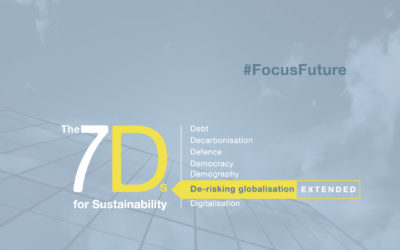
The 7Ds – De-risking Globalisation Extended
The 7Ds
30 Dec 2024
-
This paper delves into the European Union’s approach to safeguarding its economic security in relation to its principal trade partner, the People’s Republic of China. Structured into four sections, the analysis begins by examining challenges and risks possessed by the PRC and offers an overview of positions on de-risking from China and interests of various stakeholders. The second chapter provides an overview of the current and future economic security instruments of the EU and selected EU member states. To broaden the horizon of existing policy frameworks, third chapter lists some of the lessons in de-risking policies from like-minded democracies Japan, the United States, and Taiwan. Finally, the paper concludes by presenting concrete policy recommendations for EU institutions, intended to fortify the economic resilience of the bloc.
China Foreign Policy Globalisation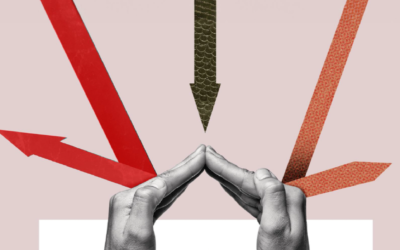
Fortifying Economic Security: The EU’s Response to China’s Risk
Other
17 Jun 2024
-
Several crises over the last two decades, including the Covid-19 pandemic and, most recently, the Russian war against Ukraine, have shown the vulnerability of global supply-chain systems and have shattered illusions about ever-progressing globalisation. This has forced the EU to rethink its traditional reliance on and support for multilateralism and global cooperation, which had led to an over-dependence on certain countries and producers in crucial fields such as raw materials and chemical products. Over the last couple of years, the Union has responded to these developments by creating a series of policies and launching initiatives to de- risk its economic relations and reduce the potential for political blackmail.
In 2023, the Martens Centre published its 7Ds for Sustainability strategy document. This text comprised 175 proposals for the next legislature to future-proof EU policy in the areas of debt, decarbonisation, defence, democracy, demography, de-risking globalisation, and digitalisation. Sustainability was chosen as the guiding principle to ensure that the policies reconcile the needs of both the present and the future, and systematically include the interests of the next generations.
The 7Ds document has already inspired reflection on what to do over the next five years. These discussions are based on Christian Democrat and conservative thinking and the available in-house expertise of the Martens Centre. For the next phase of intense discussions about the programme to be implemented during the 2024–9 legislature, the Martens Centre has invited renowned external experts to put forward their own, more extensive proposals based on the original document, thereby deepening the available expertise. It is hoped that these proposals, published at the beginning of April 2024, will help to clarify the way forward at a critical juncture, when the European Parliament, the European Commission and the European Council are negotiating on and finalising their strategic priorities.
Globalisation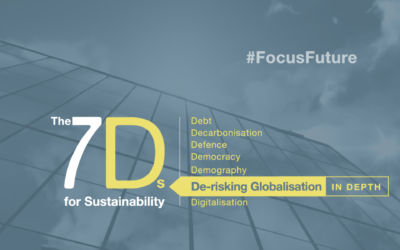
The 7Ds – De-risking Globalisation in Depth
The 7Ds
22 Apr 2024
-
European Commission President Ursula von der Leyen’s State of the Union speech has become an established news item, resonating across European media. The 2021 speech had a strong focus on recovery and the last remaining steps to overcome the COVID-19 pandemic.
Structurally, her State of the Union speech was very similar to last year’s, starting with a short reference to the ‘Big Picture’, followed by a list of various Commission initiatives, often with the promise of creating new tools, with budgetary backing. This year’s speech even ended on a similar note as last year, with a ‘human dimension story’. 2020 referenced young girls playing tennis in Liguria, while this year it was an Italian Paralympic gold medallist.
Rather than a speech on the State of the Union, the EU, its long-term vision and its upcoming challenges, the speech became an opportunity for the Commission President to market ongoing initiatives and launch new ones, focusing on the EU’s internal policies.
But although the speech’s focus was mostly internal, it reflects a desire for the European Union to become (yes, really) a true global player.
Since external strength comes from within, and no doubt driven by the momentum created by the situation in Afghanistan, von der Leyen logically followed up by underlining the importance of being ambitious in security and defence cooperation, discussing the plan to convene a Summit on European Defence under the French EU Council Presidency.
However, there is currently no lack of different cooperation mechanisms in the area of security. Instead, the challenge is a lack of motivation on the part of EU member states to engage and invest in their own defence capacity, without even thinking about cooperation at the European level. On the one hand, replacing existing progress by launching a new process with fresh expectations to be fulfilled can be counterproductive. Still, a Summit can create political momentum for further development.
Another initiative mentioned in the State of the Union speech, although perhaps surprising, is the idea of a Global Gateway strategy, a kind of response to China’s New Silk Road, also known as the Belt and Road Initiative (BRI). The strategy seeks to create partnerships with countries around the world, creating investments in quality infrastructure, connecting goods, peoples, and services around the world to build a worldwide brand. It sounds big and ambitious, but the obvious question is, where is the money?
China’s BRI is estimated to involve around $2.5 trillion at the moment. Undoubtedly, the EU will aim to use similar financial leverage as with the ‘Juncker Plan’, but securing funding for massive global infrastructure projects outside the EU’s territory and matching China will prove to be a challenge. However, a key difference between both projects is that the EU’s Global Gateway effort should be based on important EU values and aim to build genuine, mutually beneficial partnerships, as opposed to China’s strategy of debt trapping and subsequent diplomatic coercion, which are the backbone of the New Silk Road.
Currently, the EU’s external force leans heavily on its economic force and its trade ties. The “Brussels effect” makes the EU a leading regulatory force, and the current woes of the US and China put the EU in a unique position to become a promoter of global trade. It is therefore almost surprising that the State of the Union speech did not allow room for a more elaborate discussion on the EU’s role within the global economic patterns and EU trade.
Naturally, one could claim that due to COVID-19, global trade is still shellshocked. However, global trade and business are recovering much faster than expected. During the COVID crisis, the prognosis was that supply chains would be radically changed after the pandemic. As it turns out, we’ve instead witnessed increasing demand and prices, with many companies basically returning to the same production models. Globalisation as a trend will bounce back.
The European Union will not be able to project its power in the same way as big, global sovereign states. It originated in multilateralism and cooperation, holding weaknesses other global entities do not – but also possessing strengths others are lacking.
While the defence and security pillars are essential for a strong EU in the future, development is slow, and thus its primary strength remains centred on its economy. As we wait for next year’s State of the Union speech and its own human story ending, there are equal expectations on how the EU will aim to claim its place and, through its multilateral dimensions, shape the future of the global economy and trade.
Photo Credits: EPP Group in the European Parliament
Tomi Huhtanen China Defence European Union Globalisation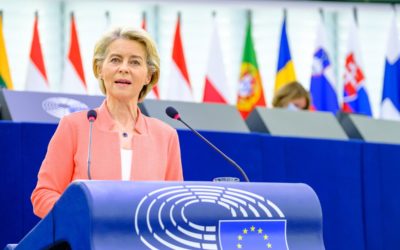

Tomi Huhtanen
Searching for the EU’s Global Role – State of the Union Speech
Blog
15 Sep 2021
-
Though bound by a strong relationship and a shared history, New Zealand (NZ) and Australia are demonstrating a different approach towards a critical economic partner. Australia and China have recently reached high levels of diplomatic friction. In April 2020 came the casus belli: the Australian Foreign Minister calling for an international investigation into the origins of the COVID-19 pandemic and China’s handling of the initial Wuhan outbreak.
The response came a few weeks after when Chinese authorities imposed tariffs on Australian barley, meat, and wine. In the following months, the list of products affected extended to cotton, coal, sugar, lobster, copper, and lumber. In addition to anti-dumping duties, the Chinese tools also included non-tariff barriers and calls to boycott Australian products. Adding to commercial retaliation, some Australian journalists were expelled from China, another journalist was placed under house arrest on espionage charges, and a tweet by a China’s Foreign Minister’s spokesperson showed a forged photo of an Australian soldier with a pointed knife to an Afghan child’s throat.
Even before the request for the COVID investigation, relations between the two countries turned sour soon after the declaration of friendship by China’s President Xi Jinping to the Parliament in Canberra in 2014. Australia, in fact, expressed mounting concerns about Chinese authorities’ interference in the both political and academic institutions, and about risks posed by Huawei’s and ZTE’s 5G and Victoria State’s participation in the Belt and Road Initiative. These are some of the 14 grievances against Australia drawn up last November by China’s ambassador in Canberra. And this list can be updated to include the revision, by the Australian government, of the concession given in 2015 to the Chinese company Shandong Landbridge Group for the management of the port of Darwin.
Not short of having demonstrated its fearlessness, Australia has nevertheless preferred not to escalate the confrontation by labelling as ‘genocide’ the discrimination against Uyghurs in the Xinjiang region, as done previously by other strategic partner of the ‘Five Eyes’ alliance.
Even NZ has been wary of including ‘genocide’ in its official documents when referring to Uyghurs in China. On 5 May 2021, the Parliament in Wellington approved a motion “concerning the serious violations of human rights taking place against Uyghurs and other ethnic and religious minorities in the autonomous region of Xinjiang” and, during the debate, the Foreign Minister recalled that NZ had not previously made an independent determination of genocide, since only international courts can prove a genocide is taking place following a rigorous assessment. China rejected the allegations as unfounded and – in Pavlovian style – threatened, but did not adopt, sanctions. NZ, in fact, is less vocal in criticising China’s authorities. The Foreign Minister herself explained that NZ is not willing to give up an independent foreign policy, and wants to develop a more mature relationship with China.
Notwithstanding the ability of Australian exporters to find alternative markets to a now-harder-to-penetrate China (except for a few products such as the hard-hit wine), the resentment against New Zealanders has become palpable. NZ is accused of going soft on China to avoid retaliations and to profit from relatively better economic relations. For both Oceanian countries, in fact, China is a significant partner for the export of products, but also for the export of non-tradable services such as tourism and education.
This trans-Tasman clash is the subject of an Australian documentary titled “Dollars VS Decency: Is China taking over New Zealand?”, released on the day Australia’s Prime Minister met New Zealand’s peer (30 May 2021). The summit was meant to reaffirm the solidity of the alliance with a joint statement expressing serious concern over developments in the South China Sea, in Hong Kong, and in the Xinjiang region.
In November, NZ will sit China’s and Australia’s leaders down around the same (virtual) table, during its Presidency of the Asia-Pacific Economic Cooperation (APEC). Bilateral economic links are too strong to be handled in a tug-of-war game. China is the largest trading partner for both Australia and NZ; however, even the gigantic China is not self-sufficient, as shown by its insatiable appetite for Australian iron ore, a key ingredient for steel, at the base of many planned infrastructures.
Considering the outcome of the last G7 and NATO summits – where China has been regarded as a challenge to the rules-based international order – Australia and NZ cannot be left alone in playing what looks like a ‘good cop / bad cop’ strategy. The European Union can help the two like-minded countries by speeding up the negotiations of EU-Australia and EU-NZ free trade agreements launched in 2018. If Australia and NZ develop stronger economic ties with the EU that, among others, offer a potential diversification of trade, they may reduce their unilateral dependency with China and gain bargaining power in a negotiation whose repercussion will go beyond the Asia-Pacific region.
Stefano Riela China Globalisation Trade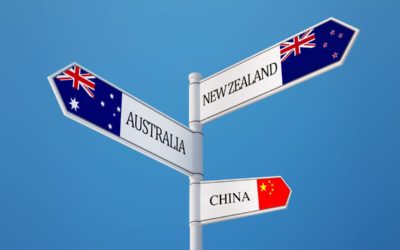

Stefano Riela
Australia, New Zealand, and China: a Bumpy Ride Towards a Dialogue
Blog
29 Jun 2021
-
While the world is focused on the aftermath of the US elections and its consequences, China is currently discussing its Five-Year Plan, the most important guiding policy document at national, regional, and local levels, which will define its policies and direction for the foreseeable future.
As a result of the successful containment of the Coronavirus, China will be the only major economy to grow this year, which makes engaging with China very attractive for governments, companies, and their shareholders.
Simultaneously, recent political developments in and around China have taken a heavy toll on China’s image in most European countries. Beijing’s deteriorating image and the lack of reciprocity for market access and intellectual property rights have also hardened positions in Brussels – a planned comprehensive investment agreement might not be achieved this year. So, how and in which areas could the strained EU-China relationship move forward?
Like in any international relationship, cooperation is built on trust, perceptions, and policies.
Perception of the EU and its member states in China
The rapidly deteriorating relationship between the People’s Republic and the United States does not (yet) seem to have had a negative effect on the image of European countries in China. Most EU countries, and the EU itself, seem to have a neutral or positive image within the Chinese population.
An example: a high-ranking Chinese government official pointed out that, while previously the USA, Japan, and Germany were all valued and trusted cooperation partners, Germany has remained the only one. The reasoning is that the current international situation makes cooperation programs with the USA impossible and the relationship with Japan is (again) burdened by history. Meanwhile, Germany and most European countries are seen as neutral and developed countries.
Europe’s generally positive image should be used when dealing with China. Nevertheless, without supporting national Chinese policies, any entity dealing with China will encounter difficulties in cross-border cooperation.
China’s Five-Year Plan is the country’s most important guiding policy document
Anyone who has a political or economic agenda in China attempts to influence the drafting of the Five-Year Plan (FYP). After the next FYP will be formally approved by the Chinese National People’s Congress in the spring of 2021, provincial and local governments, as well as state-owned companies, will follow its guidelines and turn them into concrete projects and cooperation.
The outlines for the next five-year plan were formulated in the fifth plenum of the Chinese Communist Party’s Central Committee in late October 2020. Like its predecessors, the next FYP will focus on increasing innovation and manufacturing, developing a sustainable society, raising the general living standard, and bridging the development gap between the wealthy coastal and the less wealthy rural areas. The most notable new developments will include:
-A long-term vision reaching until 2035, thus also laying the ground for the next three five-year plans;
-A push for higher technological innovation and self-sufficiency, influenced by the deteriorating US-China relationship; and
-The introduction of a new “dual circulation” model that aims to create growth based on domestic consumption, while not cutting ties to international markets.Next steps in the EU-China relation: focus on reaching global goals and tackling megatrends on commonly agreed terms
Looking from China, Europe is already a battleground for narratives in an increasingly polarised world. The ‘damage control’ tour by Chinese Foreign Minister Wang Yi, his first trip abroad after the pandemic began, illustrates the importance of Europe in Beijing’s plans. As the relationship between China and North America deteriorates, China will be looking to other countries for foreign policy successes.
In line with the European Commission’s strategic outlook on relations with China, the EU and its member states should build on their positive image and strengthen cooperation with China in mutually beneficial areas. This does not mean giving in or selling out your own values. As demonstrated by the European Union Chamber of Commerce in China in its latest position paper, one can and should be frank while negotiating with China, but this shouldn’t be done through aggressive Twiplomacy, where the negotiating partner risks losing face.
One also cannot expect China to do the EU´s homework. It is up to Europe itself to form and show unity on how it wants to cooperate with China.
In conclusion, looking at the proposed goals of China´s next five-year plan and the EU’s strategic outlook, two cooperation areas seem especially mutually beneficial. Firstly, the implementation of the Agenda 2030 and the Paris Agreement within an already existing UN framework. Both the EU and China have pledged to become climate neutral by 2050/2060. Both plan to invest billions into green technologies, green finance, and in new solutions promoting sustainability. Cooperation in this area will foster innovation that will benefit both partners and third countries. Secondly, both China and most EU members need to curb megatrends like population aging and the sustainable development of rural areas, with the goal of forming equitable living conditions. In these areas, China and the EU can change best practices and create new solutions that also benefit vulnerable groups.
Janne Leino China Globalisation Innovation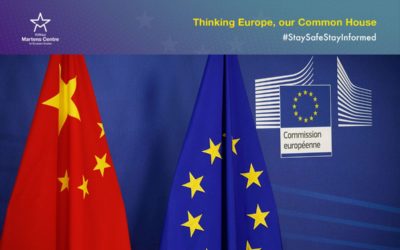

Janne Leino
China’s 14th Five-Year Plan (2021-2025): Reshaping the EU-China relation
Blog
09 Nov 2020
-
The Coronavirus epidemic is spreading quickly through the planet. Its full impact on societies, on our economies, and simply on people’s lives is still unknown. Nevertheless, chances are that the economic impact of the epidemic alone will be greater than any crisis since the end of the Second World War.
But contrary to an earthquake or a massive tropical storm, the current crisis was not a surprise, nor was it unpredictable. In fact, the risks associated with wild animal markets and their link to potential virus outbreaks were widely studied and debated, including in China, after SARS – the severe acute respiratory syndrome in 2002-3, caused by a very similar coronavirus to the one which recently appeared in China.
As early as 2007, a study by the University of Hong Kong stated that: “The presence of a large reservoir of SARS-CoV-like viruses in horseshoe bats, together with the culture of eating exotic mammals in southern China, is a time bomb.”[i] After SARS, wild animal markets were temporarily banned. Various Chinese scientists wrote about the risks related to the trade and the risks of eating wild meat.
As a result, the Chinese Communist Party and the Chinese government did take measures to control the wild animal markets and limit the risk. However, prohibiting wild animal markets is challenging, due to the fact that many of these markets, and their use of wild animal ingredients, were not only economically important, but also a part of the local culture. Thus, for political reasons, the Chinese Communist Party decided to ignore the risk and the bans were eventually gradually lifted.
But the Chinese Communist Party did not take risks solely on behalf of the Chinese people. The risk was shared by the entire global community. As a result, today, more than 4 billion people are living in some type of quarantine, afraid for their own health, their loved ones’ health, and the future of their livelihood.
Now China has made eating wild animals illegal after the current Coronavirus outbreak. But the fear is that the exceptions will keep the markets functioning and, after some time, the wildlife markets will be fully opened again – just like after the 2003 SARS epidemic.
China has been trying to avoid the question of responsibility related to the Coronavirus epidemic by supporting conspiracy theories that the US army has brought the virus to China and spreading fake news in Europe related to the epidemic.
If, as the Chinese government argues, wildlife markets were not the real source of the current crisis, then there is less reason for China to ban the markets. Therefore, it is the responsibility of the international community to make sure that wildlife markets will be banned, not only in China, but also in Vietnam and other parts of south-east Asia. We were not able to avoid the current Corona crisis, but we need to be able to stop the next global epidemic.
[i] Cheng, Lau, Woo, and Yuen, ‘Severe Acute Respiratory Syndrome Coronavirus as an Agent of Emerging and Reemerging Infection’, 2007, Research Centre of Infection and Immunology, The University of Hong Kong, Hong Kong https://cmr.asm.org/content/cmr/20/4/660.full.pdf, Vol. 20, p 683.
Tomi Huhtanen COVID-19 Crisis Globalisation Trade

Tomi Huhtanen
Could China have avoided the Coronavirus outbreak?
Blog
06 Apr 2020
-
The fact that Slavoj Žižek sees the end of global capitalism coming, should probably be read more as a sign of normality than a reason for undue alarm. After all, he’s done it many times over the last 20 years. But looking at global developments over the last couple of weeks, the Sars-CoV-2 pandemic is not only changing our daily lives on a global scale. It also has a political fallout with at least three main dimensions: the relations between China and the West, the authoritarian temptation in the West itself, and the renewed calls by the Left for Big Government. They are strongly interlinked because ultimately, they are all about the different forms of organising our societies and the relation between the individual and the collective. While it’s early days to outline political implications, some things can already be said.
The systemic rivalry between China and the West
From the very beginning, when the spread of the virus had barely exceeded Hubei Province, Chinese soft power was at stake, first referring to time-honoured Chinese practices of selling wild animals in unhygienic markets. This likely produced the outbreak, and the cult of cowardice and secrecy in the Chinese Communist Party (CCP) allowed the virus to spread initially. Then came the first pushback by CCP spin doctors, with a nationwide war declared on the coronavirus, the shutdown in Hubei Province and beyond, pictures of marching doctors but also a brutal suppression of criticism, epitomised by the fate of the early whistleblower Dr Li Wenliang.
Externally, CCP propagandists quickly began to send two messages to the rest of the world: First, that the Party is not only firmly in control, but also that Chinese authoritarianism is better suited to combat the virus – the famous time-lapse video of the ‘hospital built in 10 days’ comes to mind. Secondly, on social media, Chinese trolls began accusing the West of racism because of travel bans and quarantine for travellers from China –knowing full well that in most Western countries, the racism card plays well, at least with liberal audiences. Of course, these accusations were highly hypocritical in themselves. Imagine for a moment that the virus had truly had its origins in a Western or African country. Anyone who has ever been to China knows how the CCP would have exploited racist tropes in such a situation.
Since the beginning of March, in parallel to the first signs of an easing of the virus spread in China itself, a more ominous phase in CCP propaganda began. Travel bans and quarantine were now pronounced on non-Chinese, the blame for the virus was increasingly openly shifted to the West, and more or less open threats were made by Chinese commentators that for pharmaceuticals, the rest of the world depends on China, and China’s ‘goodwill’ might end. The generous delivery of masks and equipment to Italy in early March won’t make up for the big hit that China’s soft power has taken, together with its image as the selfless force for the good of humankind as it has been impressively cultivated in the Netflix Sci-Fi drama ‘Wandering Earth’.
Accordingly, even when we move back to global economic growth, the West as a whole, not just the US, will want to reduce economic and technological dependency on China. Some soft decoupling will become inevitable. But the mother of all systemic questions is indeed whether the future belongs to societies that are technologically best capable to harness the forces of nature, irrespective of political ideas (i.e. to China, as Bruno Maçães subtly suggests); this stance is highly questionable because it disregards cases such as Taiwan or South Korea.
The authoritarian temptation and the end of European solidarity?
As a general rule, authoritarians love emergencies, in the West as well. Of course, some could not withstand the temptation to conflate the migration crisis with the virus threat. What is more ominous is the quick breakdown of the initial determination of governments in the Schengen zone to keep internal borders open. Within two weeks, this was overtaken by an escalating wave of border closings. Certainly, any return to more national or even regional self-sufficiency as a result of the corona crisis will only reinforce already existing conservative and populist trends criticizing globalisation as such. What may eventually emerge is a new equilibrium between self-reliance and a global division of labour, but the costs of truly reversing globalisation are unlikely to be tolerated by Western societies even after this emergency.
It remains to be seen to what extent this crisis will really be a boon to the West’s new authoritarians, not only because their US idol, President Trump, has performed so dismally in the unfolding crisis in the US, but mainly because Central Europe’s autocrats may show some of the CCP’s dishonesty in dealing with the public while lacking the technology and efficiency to come to grips with the crisis. This is bound to backfire.
To draw a direct correlation between authoritarianism and effectively fighting a pandemic is surely simplistic. Of the two best performing Asian countries in dealing with the pandemic, one is mildly authoritarian – Singapore – and one is a vibrant liberal democracy – Taiwan. Iran, however, one of the worst-performing countries so far, is highly authoritarian.
Return to Big Government?
The Corona pandemic also reinforces authoritarian tendencies on the left. First, there is the classical infatuation of Socialists and Social Democrats with big government and a strong state that are not only able to set tough rules to private behaviour, but also provide high-quality universal health care. Secondly, there are the Greens, asking why tough measures strongly impacting individual behaviour are possible at such short notice in the pandemic, while they are so hard to bring about in the climate crisis – which is, according to the Greens, much more lethal than Coronavirus.
Both trains of thought make the same mistake: They confuse an obvious exception with the rule. People are willing to accept quarantines and lockdowns because they know these are temporary. Big state socialism has failed in the 20th century – catastrophically in the East, and slightly less catastrophically in Western Europe, but failed it has there, too.
We will get over this. In the upcoming weeks and months, some of our ugliest and some of our best behaviour as humans will come to light. Some of our daily routines may well change for good. But the big exception will not become the new normal. Authoritarianism – Chinese or ‘Western’ – will not be the automatic winner. The West will seek new ways of reducing dependence on China. But globalisation is not coming to a grinding halt. And Open Society is far from finished.
Roland Freudenstein COVID-19 Democracy Economy Globalisation Society

Roland Freudenstein
Brave New Coronaworld? COVID-19 and the Future of Open Society
Blog
17 Mar 2020
-
A podcast series that aims to challenge commonly held assumptions about the European project in a tour de force through European history, culture and civilisation. Podcast host Federico Ottavio Reho redefines political correctness with the help of razor-sharp arguments and beautifully drawn historical parallels.
Federico Ottavio Reho European Union Globalisation
[Europe Out Loud] In defence of globalism: A chat with Dalibor Rohac
Europe out Loud
07 Jan 2020
-
The Global Compact for Safe, Orderly and Regular (‘Migration Compact’ from now on) is an international agreement that has given rise to passions like no other recent global document. The Compact was signed in the morning of 10 December 2018 in the Moroccan city of Marrakech.
Uproar in Marrakech, quiet in New York
The text of the Migration Compact stems from The New York Declaration for Refugees and Migrants, adopted by the UN in 2016. This declaration was a result of decades of international efforts to bring a sense of order to global migration and refugee movements. One can look at the process started off by the New York Declaration as the first serious attempt for a global migration and refugee governance. The New York Declaration was adopted by 193 members of the UN, with no official record of dissent from any UN member.
The Migration Compact has a non-identical twin brother, the Global Compact on Refugees (Refugee Compact), also a result of the diplomatic process started off by the New York Declaration. According to an informed source, the Refugee Compact has gone through the UN structures with little dissent, with only the US expressing a certain degree of disapproval. Barring a last-minute revolution, the Refugee Compact will be agreed by the UN General Assembly in New York around 17 December 2018, a few days after the signing of the Migration Compact in Marrakech.
The Migration Compact had been negotiated by 190 UN governments. The US withdrew from the negotiations in December 2017, Hungary in July 2018. Between the summer 2018 and the beginning of December 2018, several other countries announced they would not sign the Migration Compact. In Europe, these included Czechia, Austria, Poland, Italy, Bulgaria and Latvia.
On 10 December in Marrakech, most governments in which the European People’s Party participates signed the Migration Compact. The impression is that all the governments with the EPP participation will be signing the Refugee Compact later this month.
The document
The Migration Compact is not legally binding, and the document stresses this multiple times. Nevertheless, according to some interpretations, the document could become customary international law in the same way that the Universal Declaration on Human Rights has become.
But this remains a theoretical proposition. For a document to become a part of customary international law, its practices would have to be ‘universally followed’ and obtain ‘widespread acceptance’. In addition, customary international law contains a concept of a persistent objector. If a state consistently and openly objects to an international norm, the norm is considered as not binding on that state.
The document contains 23 objectives. Protecting human rights of migrants is a core element but so is the sovereignty of states.
The Migration Compact does contain passages that may be problematic from the centre-right viewpoint. This includes the rights of migrants working in the informal economy, as opposed to the desirable insistence on employers declaring their employees and paying their taxes. Furthermore, the tone of inclusivity and the constant emphasis on migrant rights may not be to the liking of everyone on the European centre-right.
However, most policy objectives of the Migration Compact are in line with the European Agenda on Migration as well as the European People’s Party 2018 Congress document on migration, A Secure Europe. This comprises secure borders, minimising the drivers that compel people to leave their country of origin, the identification of migrants, criminalisation of migrant smuggling, prevention of human trafficking and government cooperation on migrant returns.
Political controversy
With the partial boycott of the Migration Compact, we are witnessing a peculiar situation. Most of the governments that are withholding their signature have negotiated the document until the last minute. The Slovak foreign minister, Miroslav Lajčák resigned over his own Socialist-led government’s withdrawal from the Migration Compact. He had been instrumental in developing the document at the UN.
The Belgian government did sign the Migration Pact but one of the coalition partners, the Flemish N-VA, withdrew from the cabinet over the issue.
The fact that the UN Refugee Compact is not suffering the same wave of boycotts as the Migration Compact, gives us an insight into the curious world of politics of immigration in the West. The Refugee Compact might also be perceived as generating obligations on the signatory states, yet all the European UN members seem committed to signing the Refugee Compact later in December.
Whether the governments who refused to put their signature to the Migration Compact have been negotiating in good or bad faith, is not up to me to decide. Likewise, it is not up to me to decide about domestic reasons for the boycott, such as the need to polarise national and European migration debates and to temporarily improve the standing of the governments in question vis-à-vis parts of their electorate.
Attack on multilateralism and the weakening of the EU position
The bigger picture is clear. The several governments’ boycott of the Migration Compact amounts to, once again, an attack on multilateralism. The Migration Compacts lays the foundations for global cooperation on migration. It offers multiple avenues for building trust between governments, thus ultimately leading to better migration policy outcomes for the EU and its members.
Those European governments that refused to sign the Migration Compact will not be entitled to complain that third country governments do not cooperate when it comes to the registration of migrants, cooperation on border control and readmission of own nationals.
The international position of the EU is weakened accordingly. The EU is currently striving to externalise migration controls by cooperating with third countries. It is difficult to see why a European country that wants to externalise migration controls would deliberately jeopardise its position vis-à-vis potential partners.
Vít Novotný European Union Globalisation Immigration Migration

Vít Novotný
Boycotting the Migration Compact: a loss of credibility for the EU
Blog
10 Dec 2018
-
When Donald J. Trump was elected US President in November 2016, some considered it necessary for Europe to start looking for new allies. As a result, some advocated for much stronger cooperation with China, especially in economic terms.
Yet, positive expectations for the future development of Europe-China relations quickly morphed into concerns, mainly due to the massive scale of Chinese investments across Europe in all sectors. China has bought or invested in assets amounting to at least 318 billion dollars (272 billion euros) over the past 10 years.
China has also expanded its cultural influence via the Confucius Institutes—a growing network of government affiliated educational organisations promoting Chinese language and culture—and by financing China studies and academic chairs in different European universities.
Until now, Chinese influence has been seen by the public as less problematic than for example the influence of Russia. However, according to Thorsten Benner and Kristin Shi-Kupfter, China seeks to weaken western unity with Europe and across the Atlantic and pushes to create a positive global perception of China’s political and economic system as viable alternative to liberal democracies.
The pressing question is, how will China use its influence in Europe while its economic power continues to grow? Is it a possibility that China will resort to more aggressive tactics?
For us, the case of China’s relations with Australia and New Zealand, and the concerns those two countries have vis-à-vis Beijing, can give an indication of what might come. Compared to Europe, Australia’s and New Zealand’s relations with China are much deeper, richer in events and history. Unfortunately, however, their relations with China have recently become characterised by ever deepening suspicion and concern.
Australia’s concerns
The Australian Security Intelligence Organisation (ASIO), the country’s domestic intelligence agency, wrote in its annual report to the Australian parliament that foreign governments are trying to extend their influence in Australian society, posing “a threat to our sovereignty, the integrity of our national institutions, and the exercise of our citizens rights.” In Australia and New Zealand, the Chinese government has gained influence in political systems, universities and media.
A particular concern are businesspeople with links to Beijing who promote pro-China views and donate millions to labour and the liberals—the country’s two major political parties. An analysis by Melbourne Law School’s Dollars and Democracy database states that between 2000 and 2016, about 80% of foreign political donations to Australia’s parties came from China.
ASIO identified at least AUS$ 6.7 million in donations to the two main political parties from two Chinese billionaires close to Beijing. Also, ASIO has identified 10 political candidates at various levels of government with strong ties to Beijing and the United Front.The United Front is part of China’s ‘soft power’ operation which President Xi Jinping has made one of the paramount objectives of his administration and is estimated to cost China between $10 and $12 billion annually.
Chinese influence is also perceptible in universities and think-tanks. Mr. Huang Xiangmo, one of the billionaires who allegedly donated money to Australian politicians, helped fund a think-tank focused on China at University of Technology Sydney and he was chairman of the Australian Council for the Peaceful Reunification of China, an organisation backed by China’s United Front. He was also chairman of the Australian-China Relations Institute advisory board. He resigned when it was questioned by academics as to whether it was becoming a mouthpiece for the United Front, for Beijing’s propaganda.
In addition, China’s state and security forces have reportedly engaged in a campaign to monitor Chinese nationals, including many students. Thus, ASIO is concerned about foreign interference in Australian Universities.
As a result, new laws have been drafted in Australia, designed to restrict the potential influence of foreign governments and to enforce greater transparency, namely aimed at the Chinese government i.e. Chinese Communist party.
New Zealand’s experience
In New Zealand the developments have been very similar. Anne-Marie Brady from University of Canterbury, released a report which received a lot of publicity, describing with many examples how China has gained influence in the New Zealand’s society, such as political donations.
Maybe the most media attention was given to a case in New Zealand in 2017, when a successful politician in foreign affairs, Mr. Jian Yang, was investigated for his background in Chinese military intelligence, which involved 15 years of training and work which he managed to conceal.
For the US, China’s influence in New Zealand is a concern, especially with regards to Wellington’s reactions to China’s territorial claims in the South China Sea. On 7 May this year, former US presidential candidate Hillary Clinton spoke in Auckland, warning of increasing Chinese influence.
China’s future influence in Europe
The level of concern in both Australia and New Zealand’s state institutions resembles the concern most Europeans have today for Russia. Also, despite the wide public debate in Australia and New Zealand about Chinese influence, China continues to use its tactics.
Australia’s and New Zealand’s experience shows that better transparency is needed as it comes to foreign influence especially related to the core processes of European societies; elections and voting periods.
China is growing its economic influence in Europe. Its economic power is not yet massive, but it is increasing rapidly. Europe consists of open societies like Australia which makes them easy to target, easy to penetrate.
Which forms will China’s influence take when it really starts to gain economic power and leverage in Europe? China’s advancement of its interest and successful penetration of Australian and New Zealand societies might give us an answer. Chinese tactics in Europe may become more assertive, aiming for greater impact and so become cause for greater concern.
Tomi Huhtanen EU Member States Foreign Policy Globalisation

Tomi Huhtanen
China’s rise in Europe: lessons learned from Australia and New Zealand
Blog
01 Jun 2018
-
If Europe’s punditry is to be believed, we’re in the middle of a trade war and the EU is under attack from Donald Trump who hates us for our trade surplus, our great automobiles and the European Social Model.
And indeed, a US President who defines trade in zero sum terms, where one side’s gain is the other side’s loss, is a problem. But before we go further in belligerent rhetoric and hit back hard with retaliatory measures, let’s stop and keep things in perspective.
First of all, Donald Trump is not the first American president to introduce trade tariffs. A recent example of a former US president attempting the same still resonates in everyone’s minds: Bush in 2002. At the time, the World Trade Organisation had deemed the new US tariffs on steel illegal, after complaints brought by the EU in March 2003.
Though we all hope that it will not come to that, the EU through Commissioner Malmström has already stated that it will not hesitate in once more engaging with the WTO to get the United States to back down on the tariffs.
Secondly, it’s worth reminding ourselves that steel and aluminium make up only 2 % of EU exports to the US, and that it’s a bit premature to speak of a trade war. This is even if, on 23 March, Trump’s punitive tariffs come into effect. The first consequence will be the even more acutely felt Chinese surplus on European markets.
This brings us to our third point: China. As China’s factories are usually state-owned and heavily subsidised, the country has been capable of keeping them open despite there being no global appetite for steel and aluminium. This has resulted in an excess capacity and, subsequently, the laying off of steel workers around the world, incapable of keeping up with the decrease in prices imposed by the Chinese factories.
It is Trump’s binary vision of international trade which has made him overlook how the trade tariffs, by not excluding the EU, will further affect the European continent as its markets will be flooded with Chinese metals. The latest developments on the part of the Trump administration demonstrate a positive twist: from further conversations on March 12, it appears the EU will be exempted from the tariffs on the condition that the EU is a reliable partner in fighting over-capacities.
That proves what has been clear all along: US and EU cooperating to fight China’s questionable trade practices has become an avenue out of the transatlantic trade crisis.
Fourthly, it is important to understand the very specific domestic circumstances in which Trump is beginning to apply ‘America First!’ to trade (which, next to migration and foreign entanglements, had been one of his three core campaign promises all along). The White House is in chaos and this week he hopes for a Republican victory in a by-election in Pennsylvania – in the heart of the Rust Belt in which steel production still plays a vital role.
US and EU cooperating to fight China’s questionable trade practices has become an avenue out of the transatlantic trade crisis.
Moreover, we should note how unpopular Trump’s trade rhetoric, and the announcements of new tariffs, are among Republicans (whereas they seem to go down well with the unions). While this doesn’t excuse what the President is doing, all of this is a strong indication that neither he nor the Republicans are ‘attacking the EU’ or the European Social Model.
Five, we might also be surprised at who, among Socialists and Greens, have recently become vocal advocates of global trade. At the peak of the anti-TTIP and anti-CETA campaigns, trade had become something of a taboo among these segments of the political sphere. It is refreshing to see them now condemning protectionism in such clear terms.
Ultimately, here is what Europeans should do: calmly engage with our American partners and have a frank discussion on bilateral as well as global trade; discuss how we can pressure China into being a fairer player on world markets, and resolve our bilateral problems on the way. If the US President is unhappy about the trade tariffs that the US and EU negotiated decades ago, let’s negotiate new ones.
This would, incidentally, bring us back to a transatlantic trade deal which would work even better if it included some regulatory convergence. Of course, we couldn’t call it TTIP. But we should use the momentum to take all those newfound friends of Transatlantic trade by their word, and strengthen the argument that if people sell and buy goods and services, we may discuss the parameters, but it’s first of all a good thing and a pillar of our civilisation.
Roland Freudenstein Anna van Oeveren EU-US Globalisation Trade Transatlantic

Roland Freudenstein

Anna van Oeveren
Keep calm, trade fairly and tackle China
Blog
13 Mar 2018
-
What a difference a year makes! Early in 2017, President Xi Jin Ping’s Davos speech about openness and sustainability seemed to herald a new China, globally responsible and therefore in many ways a potential strategic partner for Europe – especially when compared to Trump’s America which just seemed to have said goodbye to the West.
But come 2018, global media’s biggest China stories are about Australian universities being bullied into firing staff for ‘insulting the feelings of Chinese students’, European investors complaining about intrusive Communist Party cells in their Chinese factories, EU direct investment in China actually decreasing recently, German counterintelligence warning about a broad offensive of Chinese spy agencies and, most ominously, the impending nationwide introduction in China of a Social Credit System which would make Big Brother green with envy.
And this is not to mention the familiar stories about tightening controls of social media, crackdowns on Civil Society and foreign NGOs (aka ‘closing space’), and now perpetuating the authoritarian rule of one person (Xi) within the authoritarian rule of the Chinese Communist Party (CPC).
The Economist had three China cover stories in four months – all with a critical spin: One about China’s questionable trade practices, one about the dangers of Xi Jin Ping’s new authoritarianism, and the last one about how China is spreading its ‘sharp power’ across the globe.

There is no doubt that the rise (or re-emergence) of China is one of the great events of our time that will ‘echo down the ages’ as Mark Leonard said in his seminal ‘What Does China Think?’. But in the past year, the European debate about how advantageous the rapid power shift to Xi Jin Ping’s China is for us, has taken a healthy turn towards realism.
Above everything else, Europeans, and indeed Westerners in general, will have to perceive this as an ideological challenge. Xi’s ‘Chinese model’ (brutally simplified: market economy minus democracy) is not only in direct competition to the Western model of combining economic and political freedom (the takeaway from 1989 to the 21st century, if you will).
But 2017 was the year when it became abundantly clear that the Chinese model has mutated from a competing design to a threat in many ways, through a combination of military expansion, bullying neighbours, strategic investments (including ‘buying’ institutions and people) and political arm-twisting. Of course, such pearls of Western democracy as Trump or Brexit, or electoral successes of national populists across continental Europe are grist on the mills of the proponents of the one party state.
But then again, as long as the one party state produces psychopathic mass murderers such as Kim Jong Un, there is no reason for an overdose of Western contrition. Neither are we powerless, nor is head-on confrontation the only alternative to total acquiescence. Instead, here are eight steps to a more solid response by the EU:
- Putting things in perspective:
Of course, China is not – and will not be – the only show in town. Take a look at the much-hyped relevance of China to the EU’s foreign trade: In 2016, Germany, the EU’s no. 1 economy, traded with China goods worth 170 billion Euros. But Germany’s combined trade volume with the V-4 countries (together about 65 million inhabitants) was 255 Billion Euros. China’s phenomenal economic growth notwithstanding, it still faces enormous challenges in social stability, corruption, the environment and private debt.
- Maintaining unity in the EU:
Even if it’s hard, we should strive for a more coherent answer to China’s ‘Belt and Road Initiative’, coordinating among member states. A joint strategy, or at least, best practice, vis-à-vis Chinese direct investment, would be a good idea. And the governments inside as well as outside the EU participating in China’s 16+1 initiative addressing cash-strapped former communist countries should at least be offered some analysis and intelligence about Chinese investment strategies in connectivity, especially in the digital field.
- Working with our allies:
Even Trump and Brexit have not changed the laws of gravity, nor the relative community of values and interest between Europe and North America. Confronting China on its authoritarian trade model (forced technology transfers, large state-owned enterprises, WTO rules manipulation) will be an excellent field of strategic coordination with a post-Brexit Britain and a US with checks and balances still intact. NATO is also a good framework to do so.
- Compartmentalising relations:
Cooperating with China where useful and possible, but by all means pushing back where necessary. While trade, fighting climate change and, in future, even defending parts of the global liberal order such as copyright law (as Chinese inventors become more defensive) may be good areas of strategic cooperation, China’s sharp power needs to be resisted, by means of our open societies as well as the rule of law and counter-intelligence.
- Learning Mandarin (or Cantonese, for that matter):
The EU and its member states need to quickly and sustainably improve their expertise on China. That ranges from linguistic abilities to analytical capacities. It will be crucial that these efforts are financed from within Europe, and not by the Chinese government, universities or private investors.
- Institutional networking:
Think tanks and experts analysing China (and not on a Chinese payroll) must cooperate more closely, and build sustainable networks to exchange information and analysis. The EU, as well as national governments and civil society, all have crucial roles to play here.
- China mainstreaming:
China should be factored into all strategic policy areas in Europe. Our pushback against Putin is an excellent example: The Chinese leadership is watching very closely how Russia fares with its territorial annexation and military aggression. There is a Chinese factor even in our sanctions policy towards the Kremlin. Whether energy, foreign investments, technology cooperation, relations with Africa (not only in the migration context), even defence policy: there is a Chinese angle to many EU policy fields, hence China must become part of our strategy in all of them.
- Reaching out:
To Taiwan, which is the living proof that democracy and the rule of law are very much compatible with Chinese culture, contrary to what the CPC would make us believe; to Hong Kong and its courageous democracy activists; to the growing Chinese expat community, and within China to regional and local partners who often genuinely desire more independent relations to Europe. As to China’s neighbours: Countries such as Japan, South Korea and Vietnam should become part of an informal network of intelligence exchange and strategic coordination.
The West has seemed to be losing out already a couple of times in history. In the 1930s, communism and fascism looked like the wave of the future. In the late 1950s, with the Sputnik shock, the victory of the West in the Cold War looked less than sure, to put it mildly. The West has the ability – amazing to many and annoying to its detractors – of bouncing back when it’s least expected to. If 2017 was the year the Chinese dragon began to audibly growl, let 2018 become the year we developed a valid response!
Roland Freudenstein Democracy Economy Foreign Policy Globalisation

Roland Freudenstein
Dancing with the Dragon: how the EU should respond to the Chinese challenge
Blog
10 Jan 2018
-
Today being pro-trade and defending globalisation seem to be out of fashion. After Trump crushed the Trans-Pacific Partnership (TTP), and put the North American Free Trade Agreement (NAFTA) under his hammer, it does seem that the tide has turned against global trade and globalisation.
In Europe this is seen through the fall of the TTIP agreement, which in fact was already in trouble before the election of President Trump. Anti-trade sentiments are labelled as partly responsible for the rise of populism in Europe, and nationalist parties have adopted a soft-anti trade stand.
Setting the numbers straight
But the fact is that the mainstream held assumption that there is strong anti-trade sentiment in Europe is a fallacy. The majority of Europeans support free trade and want more of it, as the Eurobarometer study shows. 73% of EU citizens view free trade as positive. There is national differences of course, with 85% of Danish citizens seeing it as positive at the higher end of the spectrum and 58% of Greeks seeing it positively.
Furthermore, according to the Eurobarometer, respondents increasingly see globalisation as positive and important for economic growth. More than half of all respondents consider globalisation to be positive (54%), an increase of six percentage points since autumn 2016 and a 17-point increase since spring 2005. More than six in ten (62%) agree that globalisation is an opportunity for economic growth, and more than half (51%) agree that globalisation represents a good opportunity for companies in their country by opening-up new markets.
How do you explain these results, despite all of the negative spin in the media? The fact is that Europe and the EU are made up of mainly small and medium sized countries, which understand that political and economic isolation will not bring them strength and prosperity. Many of the countries have well known success stories of citizens’ companies being successful in global markets. Those companies could not have made it if they only had access to the market of their home country.
When the minority is loud and the majority remains silent
If trade is such a popular topic, what then explains the unpopularity of TTIP in Europe? Firstly, a loud minority together with anti-globalist networks, who managed to dominate the debate. Secondly, for the large majority of the political actors in EU capitals and Brussels, TTIP was important, but not important enough to fight and go public in defending. And thirdly, as Matthias Bauer of ECIPE points out, the anti-TTIP movement was not a bottom-up movement but clearly a top-down one:
“The widespread aversion to TTIP in Germany is the result of an orchestrated, top-down campaign initiative launched by a small number of long-established, well-connected and, thus, highly influential politicians of Germany’s Green and left-wing political parties and associated NGO campaign managers masquerading and operating under the guise of pro-democracy, pro-environment and pro-Christian civil society.”
In addition, we are only beginning to understand how Russian-related media played strongly against TTIP.
What should pro-trade forces do?
A major difficulty with debating trade agreements is that when anti-trade actors criticise trade agreements, they usually speak hypothetically about what the trade agreement could contain. The problem, for example, with TTIP was that there was no official text since the negotiations were still ongoing. It is difficult to refute obnoxious claims on the details of the agreements on a fact-basis, when the official agreement paper has not yet been drafted.
In this case, what should pro-trade forces do? Firstly, as the European Commission has already emphasised, as part of underlining the economic benefits and positive impact on growth, we need also need to make it clear that rule-based trade agreements can play a strong role in developing a rule-based framework for the global economy. Trade agreements aim to eliminate distortions and unfair practices on a global scale. They are a tool for promoting European values.
Secondly, we need to continue to find new partners for trade and work on respective trade agreements. The Commission’s intention to examine the possibilities with Mercosur is a good example of the direction we should be going in. Also, we should build on where we left off with TTIP, especially in our trade relationship with the United States.
Despite the political situation in the US, we must work on sectoral cooperation, as Vice-President of the European Commission Jyrki Katainen mentioned during a recent keynote. If an overall agreement with the United States is not possible, we should work on sectoral agreements. Despite the White House statements, there are still very important Republican and Democrat Congress members who are very much in favour of re-launching the trade agenda.
Lastly and perhaps most importantly: we must change our mindset and understand that trade is not an underdog topic, but it is a topic which the majority of voters (at least centre and centre-right ones) feel positive about. If trade is supported by more than 50% of European citizens, it must not become a “no-go area” for centre and centre-right politicians.
In conclusion, if the majority of European voters are in favour of both trade and globalisation, thus showing that the commonly held assumption about anti-trade sentiment in Europe is a fallacy, centre and centre-right politicians have an important mission to keep defending, pursuing and explaining the benefits that trade brings.
Tomi Huhtanen Economy EU Member States EU-US Globalisation Trade

Tomi Huhtanen
The European anti-trade sentiment: a fallacy, not a fact
Blog
15 Nov 2017
-
President Trump’s withdrawal from the Paris Agreement on climate change, albeit predictable, presents both challenges and opportunities for the global system of multilevel governance. Various stakeholders are ready to fill the void, including other world leaders, such as the EU, and in particular Germany; US state actors, such as California; and even cities and businesses. Whatever the outcome, the reaffirmed joint commitment to implementing the climate targets is good news for the planet.
Read the full article in the December 2017 issue of the European View, the Martens Centre policy journal.
Eva Palacková Environment Globalisation Leadership Sustainability Transatlantic

Eva Palacková
The race for climate leadership in the era of Trump and multilevel governance
Blog
02 Nov 2017
-
China first became an active and visible player in Central and Eastern Europe (CEE) in the 1950s, when it worked together with the region to stop a possible Soviet invasion of Poland in October 1956. This strong relationship was later dismantled due to the Sino-Soviet split and the volatile domestic situation in China (the Great Leap Forward and the Cultural Revolution).
It is only since 2012 that China has become active in the region again, now as an emerging global power with a strategy and new investment initiatives in play: first the 16 + 1 framework and now the Belt and Road Initiative as well. Does China consider the CEE countries to be its new playground, or test area, within the EU? Or does it instead see the region as a gatekeeper that can help it get a foot in the door to the West?
China has a vision, a pragmatic approach and political will, but the implementation of this vision has been weak. While several existing mechanisms offer new potential, they have so far only been partially exploited, due to the different business mentalities of both sides, as well as many other obstacles. China is opening up opportunities for CEE, but the latter must be better prepared for China’s new activities.
Read the full article in the June 2017 issue of the European View, the Martens Centre policy journal.
Bogdan Góralczyk EU Member States European Union Foreign Policy Globalisation

Bogdan Góralczyk
China’s interests in Central and Eastern Europe: enter the dragon
Blog
27 May 2017
-
The idea that the left/right paradigm in politics is outdated has been around for so long that it’s amazing how often we still think in left right terms. Maybe old habits die hard. Or maybe there has always been more to the old paradigm that what the commentariat made us believe.
But according to a growing chorus of pundits in 2016, now is the time to seriously let go. The paradigm du jour is open vs. closed, global vs. territorial or, as the Economist puts it, drawbridge-downers (read Merkel, Macron and Soros) vs. drawbridge-uppers (such as Trump, Putin, Le Pen, Orbán and the UK Leave campaign). I admit that this thesis has a lot going for itself: after all, the rise of identity politics (us vs. them) and the return of nationalism are among the driving forces in the success of populists.
That would indeed speak for an entirely new paradigm. But wait: there is also a crisis-driven resentment against the market economy and international trade (traditionally, a leftist idea). Moreover, the echo chamber effect of social media reinforces any kind of polarisation, no matter whether the paradigms are old or new.
Hence, from the perspective of Europe’s biggest political family, the European People’s Party, there are three things wrong with making ‘open vs. closed’ the decisive paradigm of our days.
First of all, open/closed corroborates the populist narrative of an establishment that, no matter whether it calls itself liberal, socialist, green, Christian democratic or conservative, is united in despising the ‘little people’ and that will always act in the interests of a global elite. Now, it is simply not in the interest of big tent, catch-all political families to let this narrative become dominant: if we permit the populists to act as the party of the people vs. the elites, we risk losing.
Secondly, quite frankly, big political families such as the EPP (but also the Socialists) in their current composition neatly straddle the divide between drawbridge-uppers and drawbridge-downers. Both Angela Merkel and Horst Seehofer, her fierce critic in refugee matters (and the only one among the parties represented in the Bundestag) belong to the EPP family.
Their positions are not mutually exclusive in every respect. On the role of borders in the 20th century, the German Chancellor has already shifted her position since September 2015.
If we want to keep the overall Schengen system, we need to improve the protection of its external borders.
And from an EPP mainstream perspective, there is nothing wrong with wanting to control borders. Believing that the nation state is far from being finished is not automatically anti-globalist. But claiming that in this crisis we have a ‘rendezvous with globalisation’ essentially implies that there is nothing we can do about the masses of people trying to cross our borders, economic migrants included.
But if we want to maintain the liberal world order, we had better acknowledge the importance of identity politics. If we want to integrate a large number of people from one of the most violent and backward regions of the world, we need to be more straightforward about defending our values.
If we want to keep the overall Schengen system, we need to improve the protection of its external borders, and allow for more long term exceptions on the inner borders. To put it brutally: If we don’t do this, people will eventually elect someone who does it instead (but probably less smartly). How about some of the ‘wir schaffen das’ spirit here?
Finally, there are still substantial differences between the centre right and the Socialists as well as the Centre Right and the Greens. Left vs. right has not lost all significance! How open is ‘open’, if the ‘no border’ Greens proudly claim they have killed TTIP? How open is ‘open’ if freedom is supposed to be ensured by ever new gender quota and diversity rules?
So there are good reasons for maintaining that left/right has kept a lot of relevance, especially in an economic crisis which still pits ‘printing money’ against some degree of fiscal prudence.
So what does modern European punditry recommend, in order to fight the new battles? ‘Stronger rhetoric, bolder policies and smarter tactics’, says the Economist. That is think tank newspeak at its best. Of course, making a strong case for openness – maintaining Schengen, strengthening trade – is necessary.
But at the same time, identity politics should not under all circumstances be defined as something alien to centre right thinking. In the migration movements of today, culture matters, and we shall ignore it at our peril.
How open is ‘open’, if the ‘no border’ Greens proudly claim they have killed TTIP?
Punditry’s final punch line is the reference to demographics: young people tend to think more openly, as last witnessed in the Brexit referendum. So supposedly, it’s just a question of time until the final victory of ‘open’. That would be more credible if we could be sure that ‘generation Erasmus’ still thinks along those lines 10 and 20 years from now.
But alas, we may not be so fortunate. If the ‘progressive’ spirit of 1968 had lived on in the same form as half a century ago, conservatism would have never had the comeback it had in the 1980s.
So open vs. closed may be a useful paradigm for analyzing recent debates. But it is neither a realignment of political forces across the world, nor a useful tool to shape the strategies of Europe’s centre right.
Roland Freudenstein Centre-Right Globalisation Immigration Political Parties Values

Roland Freudenstein
Is open/closed the new left/right? Paradigm shift and Europe’s centre right
Blog
13 Sep 2016
-
There’s an ambiguity at the core of the European project which calls to be solved or at least addressed, but from which the project gets much of its vitality. Is the European project supposed to apply only to Europeans or does it entertain universal ambitions? These days policymakers in Brussels will praise European values while renouncing every practical intent to extend them beyond the boundaries of the European Union as it stands. But then one is forced to ask: why praise them so much, why even call them universal values if they have such a limited scope?
In principle one could envision a different Europe, one much more interested in shaping the forces of globalization. The European Union could be much more active in spreading a certain European way of doing politics beyond its borders and the most obvious geographical sphere for such ambitions would be those regions standing between Europe and Asia, sometimes indistinguishable from Europe itself. Slowly expanding its influence eastwards and having within its sights a more deeply integrated Eurasia is an immediate task.
Everything changes if you start thinking along these lines. The European Union suddenly becomes a political agent rather than a territory. European because it is a political will based and organized in Europe, but global in the scope of its action and ambitions. To the extent that forming a strong political will, being a political agent, is more inspiring that being part of a territory, being an object of power, this would be a better and more perfect Union.
When Russia and China developed their new, mammoth integration projects – the Eurasian Economic Union and the Belt and Road Initiative – they had one underlying goal: to show Europeans that their decades-old integration project was one among others, benefiting from no special aspirations to universality. But if this underlying goal succeeded beyond the most optimistic expectations, that was because the European Union was already, and very much on its own, retreating within its borders. I cannot pinpoint precisely when this retreat happened. Today it is indisputable,
Both Russia and China are therefore ready for the next stage in their plans. The goal now is not to remove the universal pretensions from under the European edifice but to build such pretensions for their own projects. Take the case of Russia: if you talk to policymakers in Moscow they will tell you that Russia, not Europe, knows how international politics works. Europeans live in an imaginary world just of their own, Russians live in the real world. Europeans are parochial, Russians abide by the more or less universal rules of power politics.
In Beijing – where I recently had a number of very fruitful discussions – the claims to universality are no less striking. I was told by policymakers that China wants to give back to the world what it received over the last three decades and heard from academics that China is actively developing values that can appeal to every human being: some version of development and well-being can be readily understood and assimilated by every nation on the planet in a way that democracy and human rights cannot.
In the future historians will no doubt marvel at the speed with which the European Union transformed itself from a universal project into a geographically limited (perhaps increasingly limited as every European periphery starts to look more and more at odds with the ideological core) territorial unit, uninterested in influencing what happens outside and soon enough struggling to avoid being influenced and shaped by other – more healthily constituted – political agents. The current European malaise – in almost all its forms – has its root in this phenomenon.
“Let me make a prediction: within twenty years Europe will to a considerable extent be a part of Eurasia.”
Let me make a prediction: within twenty years Europe will to a considerable extent be a part of Eurasia. What I cannot predict – because it is still open to political decision and action – is what this Eurasian supercontinent will look like. Will it be, at least in some fundamental respects, a larger version of the European Union or will the European Union be dramatically changed by the need to adapt to the rise of new political abstractions, new universal values, which both Russia and China are actively developing and propagating? And yes, in this latter case, we shall still be dealing with universal, abstract values. Much of the European complacency has to do with the conviction that Russia and China cannot speak in a universal voice, but as I argued above this is historically and politically wrong.
Evidently if as a European you are convinced that other superpowers have only one of two alternatives – remain mired in parochial and nationalist myths or embrace abstract European ideas – then there is no need to rethink the European Union as a political agent. We can just sit back and watch the superiority of the abstract and universal play itself out on the world stage. But let me repeat: Russia and China have their own political abstractions. The clash – if it happens – will happen at the level of powerful political abstractions.
A clash is not inevitable, of course, but think about it: what better chances do we have to avoid conflict in the great Eurasian landmass than to spread European political concepts of cooperation and human rights outside our own European boundaries? The moment is a critical one. The tectonic plates have started moving – we need all our resources to balance this movement and make these pieces fit together as smoothly as possible.
There is one final reason why Europe should become more actively interested in the project of Eurasian integration: to combat the forces of disintegration within Europe itself. The European Union is in desperate need to strengthen its political capacity, its ability to act collectively. So far this has been defended through a vague appeal to history and feeling, but ultimately political capacity can only be strengthened if there is a goal for the sake of which it will be exercised. The European Union needs to become a stronger political agent not in order to fulfill a moral or historical commandment, but in order to perform the tasks which the future will call for: extend its influence outside its boundaries, manage the flows across the borderlands and work for a peaceful future in greater Eurasia.
Bruno Maçães European Union Globalisation Values

Bruno Maçães
Europe and Eurasia: the EU beyond its boundaries
Blog
15 Jun 2016
-
When the Tiananmen demonstration took place in late spring 1989, the west and other democratic countries were expecting that developments similar to those that took place in Central and Eastern Europe in the same time period would equally ensue in China. Communist powers were losing their grip on society around the world and China was expected to follow suit.
“For many years, a big revolution in China
was predicted, but never materialised.”
The government initially took a conciliatory stance toward the protesters but as the demonstration spread over 400 cities by mid-May, China’s government decided to use force. Martial law was declared on May 20 and 300,000 soldiers were mobilised to Beijing. Demonstrations were cracked down upon and many protesters were arrested. In the end, Chinese political power did not change and the country moved forward to become the greatest economic miracle of the past decades.
Over the years many have predicted that eventually China will be forced to change, as it can go only so long with its huge growth leaning on industrial production and ultimately, when trying to ensure the growth through increase of innovation, it will lead to more open and democratic society.
But year after year, these predictions have fallen empty. China has remained tightly politically controlled by the communist party. The China’s communist party was able to hold power, due to the huge unquestionable economic success and the continuous growth of the past 40 years.
Nevertheless, China today is a capitalistic economy, even if it is state capitalist economy. A modern market-based economy, it has inherited a tendency for cyclical changes. This is linked to the fact that China’s competitive potential for productivity increases has declined and is bringing China to a totally new situation unseen in past decades.
Rapidly cumulating debt, falling exports and imports, and news of expectations to lay off 1.8 million workers in the coal and steel industries are not signals of slowing economy. They are signs of major economy heading towards severe economic depression – a totally new phenomenon in new modern China.
For many years a big revolution in China was predicted but never materialised. As a result, today very few are speculating about what might happen internally in China if an economic crisis accelerates. In 2011 when the Arab revolutions swept through the Middle East and North Africa, this came as surprise to many experts.
“People […] usually rebel when they have something and they are about to lose it.”
Political establishments which had ruled for decades were suddenly challenged and in many cases overthrown, without any substantial rapid change in societal or political conditions before. The lessons learned from Arab revolutions is that the question is not if societies under stress have a tipping point but rather when that point is reached – and what can trigger it.
People do not usually intend to rebel when they don’t get what they want. They usually rebel when they have something and they are about to lose it. Today in China a large amount of people feel that they are losing something they had or something that was promised to them.
The economic crisis has invited societal backlash in China for a number of reasons. First and foremost, there is a growing fear that jobs will be cut. It has already been announced that 5-6 million state workers will be dismissed over the next two to three years in order to curb industrial overcapacity.
Additionally, working conditions deteriorate in times of labour market uncertainty. Powerful employers have potential to abuse employees by failing to pay them on time or ensure safe working conditions. While enterprises still report growth, Chinese households are struggling. Personal debt frequently goes unrecorded but this climate of unrest and fear has led to increasing numbers of demonstrations. Already in 2010 over 180,000 protests, riots and other mass incidents took place across China[1] and that number is steadily growing.
How is China’s political leadership prepared to manage the upcoming turmoil? China’s leaders Xi Jinping seems to be establishing tighter rule and control, and enforcing his own cult kind of image. These are not very ‘outside-the-box’ tools to deal with China’s population potential discontent.
China’s model has been portrayed by China as an example also for other countries. China’s political establishment is now facing the ultimate test. Whether this boils down to the continuation of dynamics started in Tiananmen Square remains to be seen.
But today’s China is so significant for global developments and the economy that the wishful scenario for rest of the world is that any internal tensions China might have will be relieved in a stable and non-destructive manner. Hopefully, at the end of the process, China’s leadership will have the insight that China today is strong enough to offer freedom and empowerment to its people in order to guarantee China’s future success.
[1] Wall Street Journal http://www.wsj.com/articles/SB10001424053111903703604576587070600504108
Tomi Huhtanen Democracy Economy Globalisation

Tomi Huhtanen
China and the return to Tiananmen Square
Blog
19 May 2016
-
In Asia the rise of both China and India is becoming a reality. Their growth is of an unprecedented scale. While the US continues to be the only superpower, it needs the help of like-minded countries to deal with international challenges. Beyond 2030, the G3—the US, China and India as the pillars of a tri-polar world—may become a reality.
In order to cope with changes of this magnitude, increased cooperation between the US, Europe and democracies in Asia is essential. To be successful in adopting this new strategic landscape, it is necessary to strengthen the ties between Europe and democracies in Asia. In this regard, rule-making is the key area for success.
Japan is contributing to these efforts by applying a comprehensive engagement policy towards China while strengthening its alliance with the US. Establishing strategic ties with India is also important. Japan and Europe can do much to help achieve stability. After all, Japan needs a strong and engaging Europe, just as Europe needs a strong and active Japan.
Read the full articlein the June 2016 issue of the European View, the Martens Centre policy journal.
Masafumi Ishii Foreign Policy Globalisation Security
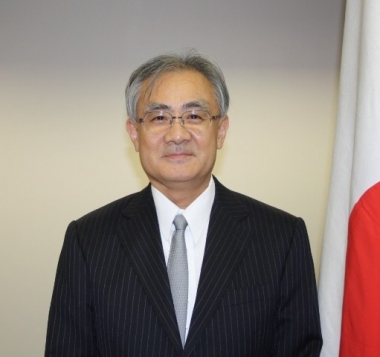
Masafumi Ishii
Regional security in Asia: Japan’s strategy for stability and the role of Europe
Blog
03 May 2016
-
Wikileaks, Cablegate, Offshore Leaks, Lux Leaks, Swiss Leaks, Panama Papers…the last few years have witnessed a spectacular surge in scandals sparked by journalistic leaks of confidential information. With the exception of the first, all others exposed elaborate systems of tax avoidance used by firms and prominent individuals to deflate their tax bills by taking advantage of low tax jurisdictions.
Invariably, revelations provoked outbursts of indignation on all sides of the political spectrum and increased popular anger against ‘privileged’ elites. The occasion was seized by law-makers, international organisations and regulators to vow once more to ‘do something’ about this, to assault the last fortresses of bank secrecy and to move to a world of total transparency in people’s wealth and income.
I confess that I would not like to live in such a world. And I suspect that it would be a far less free and ultimately less prosperous world than the one we know. I am no friend of tax evasion and not even a defender of tax elusion. But there are aspects of the mainstream opinion on tax avoidance and fiscal transparency that any person believing in the sanctity of individual and economic freedom should be deeply uncomfortable with. I would like to signal two of them.
First, there is the ideological option in favour of total transparency – and therefore potential total control – that is implicitly adopted in this debate. It is the red line connecting the more political revelations of Wikileaks with the tax-related leaks of the Panama papers. At the root of it there is a radical breed of ‘democratism’ that treats power and wealth with suspicion – as somewhat fraudulent and illegitimate – and struggles to tear apart the veil of secrecy often protecting their holders. The objective is exposing them nakedly in the limelight, where they will stand defenceless against the conforming attacks of people’s anger and indignation. They will be stigmatised as the morally corrupt and undeserving citizens they are.
This form of staged pressure with strong moral overtones is frankly scary to conservative and liberal eyes. Secrecy and freedom are historically intertwined in the most diverse realms. There is no voting freedom without secret ballot, and freedom of correspondence is a fiction unless one’s letters are inviolable. Can there be real economic freedom if not a cent of one’s wealth can elude the public eye?
There is a second unspoken assumption I detect in the common discourse on tax avoidance. It is the belief that all wealth ultimately belongs to ‘society’, not to those who created it. The implication is that the latter are left the enjoyment of part of it to the extent agreeable to society, as represented by its democratic authorities; but there is no upper limit to the proportion of private wealth society, i.e. the progressive State, can legitimately decide to confiscate to its owners for its own purposes. This is well illustrated by a declaration of Sergei Stanishev, President of the Party of European Socialists, with reference to the Panama papers: ‘The money that these people were hiding’, he said, ‘does not belong to them — it should have been redistributed for the benefit of all.’
How much of it should be redistributed? Perhaps all of it? Is there no limit beyond which society’s claim on its people’s wealth stops being a legitimate demand to promote the public good and becomes instead an odious act of oppression? For those of us who believe in economic freedom, such a limit should exist. This means that, when we discuss tax avoidance, we should, at the very least, be indignant of the exorbitant fiscal demands of modern states as much as we are of the creative tricks used to circumvent them. Such balance is hard to find in the commentaries I hear around, including many coming from the centre-right and the right wing of the political spectrum.
I am familiar with the socialist argument that the rich are getting richer, the poor are getting poorer and the middle class is disappearing. This, we are told, would intensify the urgency to close up all available opportunities for tax avoidance. However, from Marx to Piketty, socialists have been making this point for well over a century. Each time they were proven wrong in the long run. Do we really have solid evidence to argue that ‘this time is different’? I have my doubts.
Finally, there is a most important issue that casts the whole debate on tax avoidance in a completely different light. Historically, tax avoidance was one of the major drivers of Europe’s economic development in the modern era. In ‘The European Miracle’, his classic work on the subject, notable economic historian Eric Jones clearly showed that crucial to laying the foundations for Europe’s economic rise was the ‘curtailment of predatory government tax behaviour’. But what made it possible? The fact is that, at the beginning of the modern era, Europe was a hodgepodge of kingdoms, principalities, and city-states constantly eroding each other’s ‘tax base’ – as modern technocrats put it – through remorseless tax competition. In other words, early modern and modern Europe was a paradise of tax avoidance in which the confiscatory fiscal instincts of rulers were held in check by numberless ‘exit options’ for merchants and bankers. In all likelihood, we owe the rise of a modern competitive economy in Europe – and ultimately our very prosperity – to this fact.
It is no surprise that the leftist ideal should not be the decentralised and competitive Europe of the early modern era, but early modern China, a formidable centralised empire whose bureaucracy of mandarins always managed to squeeze the most out of rich and poor Chinese alike. It was enough to ensure that the country missed out on modern economic growth until the 1980s. But the urge of many centre-right politicians and commentators to embrace the crusade against tax avoidance and for tax harmonisation – instead of focusing on reducing taxes for everyone, rich and poor, so as to make tax avoidance unnecessary – will forever puzzle me.
Federico Ottavio Reho Economy Ethics Globalisation Values

Federico Ottavio Reho
Panama papers: on tax avoidance we take too much for granted!
Blog
25 Apr 2016
-
In recent years mainstream political parties on both the right and the left have been confronted with new challenges. For the centre-right, recent electoral results in Slovakia and, to a much lesser extent, Germany have been disappointing. The centre-right is also facing difficulties in other countries, such as Poland and Italy.
Populists gain popularity, claiming to be capable of cleaning up the Augean stables of political establishment, unashamedly exploiting difficulties that currently haunt Europe and presenting themselves as brave taboo-breakers and genuine defenders of the public interest. Although demagoguery is nothing new– neither is periodic public disappointment in incumbent leaderships – still the question remains: why are mainstream parties struggling so much today?
The world is obviously changing, as are public attitudes and the political landscape. First, the decline of traditional political ideologies has created volatile public opinions and electorates, ultimately fragmenting the ‘core electorate’ of loyal supporters on which traditional parties had always relied. Today on any public policy issue a multitude of opinions often unrelated to official party positions can be heard.
People vote less and less on ideological grounds and rather tend to position themselves based on how they expect specific policies will affect them. Another consequence of the decline of traditional ideologies is a tendency towards increasing fragmentation of our political systems. As a result, mainstream parties have often become broad coalitions representing widely diverging viewpoints on issues such as immigration or foreign policy. This makes them easy targets for populist attacks.
Second, the last decades have witnessed spectacular transformations in communication. The internet fostered a more individualist approach to communication and hugely increased the amount of information available to anyone, thus testing people’s ability to select and judge. A fragmentation and possibly even a polarisation of perspectives seem to have resulted, as the many cases of people who radicalised online in complete solitude show. Social networks have compounded these trends, giving voice to a disorganised wealth of opinions largely devoid of any consistent and comprehensive world-view or value systems.
Third, globalisation brought about revolutionary economic and social changes. We know that in the long run free trade makes us all more prosperous and productive. However, in the short run some people are hurt by this process, some industries are dislocated and inequality may be increased, thus fostering the kind of angry reactions we are seeing in the US and many European countries. Populism breeds in this environment of growing frustration and polarisation.
Tackling such distortions of our democratic systems is obviously impossible without reforming mainstream parties. It is high time for such parties to realise that in order to remain relevant they should adapt to new realities, be open to reform and embrace political innovation. We should also discourage demagogic tendencies within our own ranks. Mainstream parties should not play populist cards and take up radical positions hoping to catch a few additional votes. While political entities should pay heed to public mood and concerns, there need to be certain red lines here, as opportunistic shifting toward radicalism and xenophobia will only demonstrate a lack of moral principles.
Centre-right parties should recognise and take into account the increasing role of emerging political factors such as social movements, non-party politics, and policy-based ad hoc political aggregations. It is also time to consider new types of party membership and political engagement, including for those who feel victimised by the processes of globalisation. Parties in question should use smarter, more flexible and diverse approaches in offering objective information, clear-cut political vision, and effective educational strategies as counters to demagogy and populism.
They should develop new ways of strategic communication focused on simplification of political language and concepts, employing up-to-date technological means, evidence-based planning, and context-determined approaches. This in turn requires educating both the leadership of parties and their members, as well as modernising and democratising intra-party governance, decision-making, and information flows.
Timing often means everything in politics. If party decision-makers wait for too long before taking the necessary steps, demagoguery will proliferate and the European project will suffer. Fundamental party reform may be the only adequate response towards such existential threats. If these threats are not duly acknowledged and countered, basic European values may be at grave risk.
Teona Lavrelashvili Centre-Right Elections Globalisation Political Parties Populism

Teona Lavrelashvili
Between a rock and a hard place: challenges ahead for centre-right parties
Blog
20 Apr 2016
-
The West has exercised international hegemony since the Middle Ages. The European states, until 1918, and the US, up to the end of the Cold War, proved capable of imposing their leadership through their military and economic dominance. Today, however, the Western nations are not the only world powers. China, India, Russia and some Islamic countries share global leadership with the US, while Europe is struggling to find a way to be relevant in the twenty-first century.
Merely constituting a massive common market is insufficient. In this endeavour Europe is not taking advantage of its most valuable asset: its rich cultural legacy, rooted in thousands of years of history. Ironically, the young US has thus far done a better job of projecting power globally by exploiting its soft power. Placing the humanities back at the centre of education would be the best way for Europeans to recover both their identity and an important role on the world stage.
Read the full FREE article published in the December 2015 issue of the European View, the Martens Centre policy journal.
Bruno Aguilera Barchet Education EU-US Globalisation

Bruno Aguilera Barchet
Europeans: don’t be afraid of your culture!
Blog
23 Nov 2015
-
Although populist radical right (PRR) parties have been on the rise since approximately the mid-1990s, the elections to the European Parliament in May 2014 were the most telling mark of their success. Parties such as the National Front (Front National, FN) in France, the UK Independence Party in Britain and the Danish People’s Party (Dansk Folkeparti) in Denmark all attracted about 25 % of the votes and became the biggest parties within their respective countries.
They were not the only ones. The Freedom Party (Partij voor de Vrijheid) in the Netherlands, The Finns (Perussuomalaiset) in Finland, and the Freedom Party of Austria (Freiheitliche Partei Österreichs, FPÖ) were also reasonably successful during the European elections. The day after the elections, various media outlets were talking about a ‘political earthquake’.
What is going on in Western European democracies? Where has this upsurge of PRR parties come from? Before it is possible to answer these questions, it is of vital importance to carefully define what we are talking about when we employ the label ‘populist radical right’. Which parties belong to the PRR party family and why.
Read the full FREE article published in the June 2015 issue of the European View, the Martens Centre policy journal.
Matthijs Rooduijn Euroscepticism Globalisation Immigration Populism

Matthijs Rooduijn
The rise of the populist radical right in Western Europe
Blog
08 Sep 2015
-
GLOBALISATION REFLECTS OUR CHOICES
Ireland’s new Minister for European Affairs, Paschal Donohoe TD, gave an interesting speech last week. He made the point that globalisation, of which many people complain, is not something “done to us, but is a consequence of the human desire to communicate, share, and exchange”. He is right.
He could have added that humans also want lots of variety and choice in their lives, sometimes to an excessive degree, and that this drives globalisation forward as people go to the ends of the earth to find elusive “highs” in their lives. He went on to say that the European Union gives us an opportunity to “positively mediate the consequences of globalisation”. He is right here too. A small country on its own, like Ireland, could have little impact on global trends, but the EU, as a block, can make a difference. Globalisation has been facilitated by the internet, Skype, containerisation, cheap air fares and plentiful energy sources.
All these took investment to generate and would not have happened if people did not want them or were unwilling to pay for them. These technologies cannot be “uninvented” now. So globalisation cannot be reversed. It is here to stay.
HOW SHOULD WE COPE WITH THE CONSEQUENCES OF GLOBALISATION?
But all this variety, all this communication and all this exchange does not necessarily make us happier.
In fact, the more choices we have to make, the more discontented we can often become. This is especially so if we feel we have to make these choices to keep up with neighbours or others with whom we feel we must compare ourselves. Choices are hard to make. They require an effort. They involve saying No, as well as Yes. And the more choices you have, the more are the things you have to say No to. The more options you have, the more regrets you may have about the choice you could not make. The more choices we have the more we expect of life and of ourselves.
“The Paradox of Choice”, by Barry Schwartz, had the subtitle “How the culture of Abundance robs us of satisfaction”. People are shopping more now, but enjoying it less. Increased choice may actually contribute to the recent epidemic of clinical depression. Depression has tripled in the last two generations, despite all the treatments now available, that were not there 60 years ago.
The culture of “more choice” undermines institutions like churches. Because choice is the priority, people do not want to regard religious teachings as commandments, about which they have no choice, but as suggestions about which they themselves are the ultimate arbiters.
The over estimation of the value of choice may also have something to do with the increased divorce rate, because, as Schwartz puts it, “establishing and maintaining meaningful social relations requires a willingness to be bound and constrained by them.” But constraints are exactly what the ideology of choice rejects!
EUROPE NEEDS A RENEWED VALUE SYSTEM, IF IT IS TO MEDIATE GLOBALISATION
“Studies have estimated that losses have twice the psychological impact as equivalent gains” says Schwartz. In other words, people hate losing 100 euro, a lot more than they like winning 100 euro. This may explain why people in modern well off societies are so anxious, and why, in the face of recent economic losses, many are regressing to old dead end ideas like nationalism, class warfare, and xenophobia.
Happiness is at last being measured by economists, as well as the gross domestic product. It seems that once a society’s per capita wealth crosses a threshold from poverty to adequate subsistence, further increases in national wealth have little effect on happiness. You may find as many happy people in Poland as in Japan, even though the average Japanese is much richer than the average Pole. This should make us stop and think.
Economic growth is a good thing, but it has physical limits, as we are discovering with climate change and pollution. Economic growth also has psychological limits, in the sense that some forms of growth increase anxiety by offering people a bewildering array of choices that they do not feel competent to make. Markets only work well if people are informed enough, and have the time and mental energy, to make wise choices.
Laws and government subsidies will never be enough. Societies need a strong value system if they are to be happy. These values must put human respect ahead of material things and human relations ahead of maximising choice. The science of economics is only beginning to recognise this.
If the European Union is to positively mediate the consequences of globalisation, it must ask itself whether the values of more choice and more material abundance, imported from economics, are sufficient to build a good society. I believe they are not, but I do not have the sense that a discussion of alternative and better European values is yet taking place.
John Bruton Economy Globalisation Growth

John Bruton
Globalisation is not something that is done to us
Blog
04 Nov 2013
-
The Centre for European Studies is proud to participate as a Strategic Partner at GLOBSEC 2013 (Bratislava Global Security Forum), a high level conference that will take place during April 18-20, 2013.
Founded eight years ago, the GLOBSEC Bratislava Global Security Forum has become a unique foreign policy and security platform – giving a Central European twist to the strategic debate on transatlantic foreign policy, economy and security. With the participation of over 500 key stakeholders from more than 40 countries, GLOBSEC has acquired a stable position among the elite club of major conferences in Europe and North America and is often compared with prestigious forums held in Brussels or Munich.
Organised by the Slovak Atlantic Commission in cooperation with a wealth of institutional and international partners, GLOBSEC 2013 will welcome, among others: H. E. Radoslaw Sikorski, Minister of Foreign Affairs of the Republic of Poland; H. E. Karel Schwarzenberg, Deputy Prime Minister and Minister of Foreign Affairs of the Czech Republic; H. E. Štefan Füle, Commissioner for Enlargement and European Neighbourhood; Yves Leterme, Deputy Secretary General, OECD, Paris; Hon. Zbigniew Brzezinski, former National Security Advisor to the President of the United States, Washington, D.C.
This year, the Forum focuses on issues central to transatlantic and regional cooperation, including European economic prospects and the future of global economic governance. Panellists will also engage in debates over the character of Central European defence cooperation and Central Europe’s energy concerns. Other burning issues to be tackled at GLOBSEC 2013 include NATO’s post-ISAF role, new threats to cyber security, China’s role in the global financial crisis and challenges on Europe’s South-East doorstep.
As part of a packed programme, CES Deputy Director and Head of Research Roland Freudenstein will appear as a speaker in a panel entitled ‘Addressing Iran: Prevention or Treatment?’; he will be joined by Richard Norton-Taylor, Security editor with The Guardian, Amb. Kurt Volker, Executive Director, of the McCain Institute for International Leadership, Ayman Khalil, Director of the Arab Institute for Security Studies in Amman and Emily Landau, Director of Arms Control and Regional Security Program with the Institute for National Security Studies, Tel Aviv. CES Research Associate Katarina Králiková will moderate a panel on Arab transitions as part of the Young Leaders Forum side programme. Visiting Fellow Henna Hopia is also attending the Forum as commentator during one of the dinner sessions, entitled ‘UK in the EU: with Europe but not of Europe?’
For more details concerning GLOBSEC 2013, past editions and live streaming of this year’s public sessions, please visit: http://www.globsec.org/globsec2013/
Defence Eastern Europe Foreign Policy Globalisation Security
CES joins GLOBSEC 2013 in Bratislava as Strategic Partner
Other News
16 Apr 2013
-
China has paid dearly for its geopolitical rise. The Corona crisis is the latest example of the risks involved with massive investment in the Silk Road. The megaproject, which is also known as the Belt and Road Initiative (BRI), was launched in 2013 to underpin the rapid expansion of China’s economy by outbound investment beyond its own national borders. It encompasses infrastructure investments, development policies, investment and trade relations, and financial cooperation with the BRI partner countries. Moreover, it represents a crucial policy to foster China’s geopolitical rise, i.e., by internationalising China’s financial system and its currency, enabling a strong export-driven economy.
The recent pandemic has caused substantial economic downturn and led to an outflow of capital in many BRI countries. The outbreak adds a new hurdle to the trade and infrastructure programme by prompting delays and disruptions, e.g., through labour shortages caused by quarantine measures. This amplifies risks attached to financing investment projects in less politically and economically stable developing countries. However, not only are many countries caught in a Chinese debt-trap, but China itself needs a strategy for managing non-performing loans amid the crisis. Loan defaults on the Silk Road could jeopardise the Chinese mega-project.
China Globalisation Industry Macroeconomics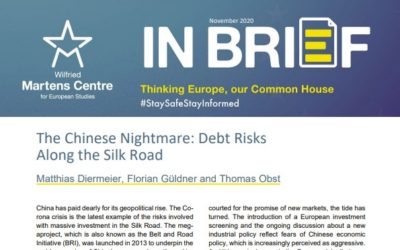
The Chinese Nightmare: Debt Risks Along the Silk Road
IN BRIEF
19 Nov 2020
-
Rules-based trade is under attack, and the World Trade Organisation (WTO) is at risk of marginalisation. The COVID-19 pandemic and its detrimental effects on public health, value chains, and industrial production have brought back national export restrictions and stopped the free flow of goods and people. Buzz words such as ‘decoupling’, ‘sovereignty’ and ‘autarky’ have quickly returned to the global stage. However, COVID-19 is not the first shock to global trade. The WTO is already facing an existential crisis due to a deadlock in negotiations, blockage of institutional reforms, and paralysis of the dispute settlement mechanism (DSM). Nevertheless, there is hope that countries experiencing the effects of disrupted trade means the EU can take the lead in global reform efforts.
COVID-19 Crisis Economy Globalisation Trade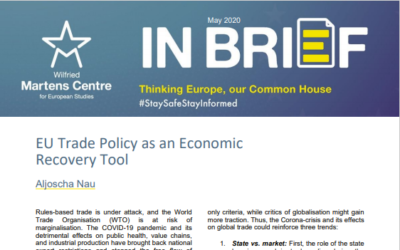
EU Trade Policy as an Economic Recovery Tool
IN BRIEF
27 May 2020
-
This paper analyses the unstoppable phenomenon of globalisation through the lens of cyberspace. It looks at how the threats associated with this domain could evolve into a cyberwar. The paper assesses the EU’s stance on cyberspace and elaborates the directions that the EU should develop and pursue in this regard.
It begins by examining the meaning of various cyber-related terms as a way of explaining the risks, threats and challenges of cyberspace. It then goes on to detail the EU’s approach to cyberspace. The paper concludes by outlining a way to increase the EU’s cyber-defence capacity and scope through the creation of an EU cyber-command that would centrally coordinate operational capacity in cyberspace in order to pursue the development of hard and offensive cyber-power.
Finally, the paper also builds on the European People’s Party’s (EPP’s) call for strengthened resilience against cyberwar and offers a suggestion for an EU response to hybrid warfare and cyberwar, as outlined in the EPP’s Congress document Europe Secures Our Future.
Defence Globalisation Internet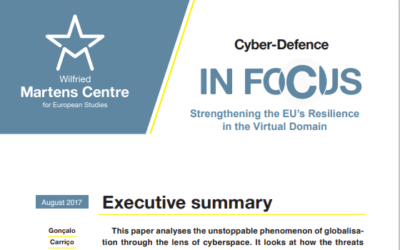
Cyber-Defence: Strengthening the EU’s Resilience in the Virtual Domain
IN FOCUS
29 Aug 2017
-
With the global governance system becoming increasingly unrepresentative of the changed realities of the twenty-first century, the emerging powers have been all the more proactive in seeking to reshape it. This paper focuses on three multilateral structures recently created by the emerging powers and asks whether they represent an emerging alternative international order or rather the (re)ascendance of international liberalism. More specifically, the paper assesses the development of the Asian Infrastructure Investment Bank, the New Development Bank and the Contingent Reserve Arrangement. I argue that these bodies aspire, not to eclipse their established counterparts, but to complement them, by building on their best practices and omitting their shortcomings.
Foreign Policy Globalisation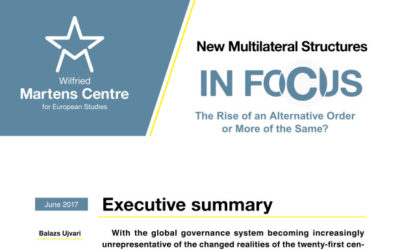
New Multilateral Structures: the Rise of an Alternative Order or More of the Same?
IN FOCUS
27 Jun 2017
-
There is every indication that the international system is undergoing a period of significant transformation. The substantially higher growth rates of the emerging-market economies in comparison with those of the developed economies are changing the global distribution of power. Studies project that if economic trends are not reversed in the coming years, China will surpass the US and become the world’s largest economy, India will emerge in Japan’s place as the third-largest economy and Brazil will outpace Germany as the fifth-largest. This book underscores the complexity of forecasting international politics and proceeds cautiously to investigate the questions of change and continuity, examining several actors with respect to multiple issues and across different levels of analysis. Taken as a whole, this collection of essays offers a series of snapshots of different aspects, and from varying angles, of an international system in motion.
Foreign Policy Globalisation Security
International Politics in Times of Change
Collaborative
02 Jan 2012
-
In all probability 2011 is going to be one of the most critical years in recent decades. The problems created by the global economic crisis continue to affect the lives of ordinary people and could become a source of social instability. At the same time, developments at international level are creating a sense of uncertainty since long-established balances are facing profound challenges. With contributions by distinguished scholars and policymakers from Greece and abroad, the Konstantinos Karamanlis Institute for Democracy Yearbook 2011 addresses various issues of public debate both in Europe and internationally. Special attention is given to the global economic crisis and, more specifically, to its impact on Greece, which has recently found itself at the epicenter of international attention. Certain of the essays highlight the importance of leadership as an instrument for political reform, while a special section provides an update on the major global issue of climate change.
Crisis Economy Environment EU Member States Globalisation
The Konstantinos Karamanlis Institute for Democracy Yearbook 2011: The Global Economic Crisis and the Case of Greece
Collaborative
05 Dec 2011
-
There are an estimated 600,000 Finns living abroad. We know surprisingly little of their voting behaviour even though statistical data is available. What drives expats to vote? Tradition, duty? Genuine willingness to influence in the political life of the fatherland? Is there always a strong correlation between time spent away and non-voting? How big an issue is physical distance? Is alienation shown through non-participation? Which would be ways to activate expat voters to participate? Is national election in the old homeland less interesting than, say, local election in the country of residence? Which lessons could we learn concerning the European election? Are the expats happily assimilated or still identifying themselves clearly as Finnish – or do they end up feeling in-betweens? In short, the purpose of this study was to to examine expat Finns’ voting behaviour through case studies in major expat areas, to discover factors behind political participation abroad; obstacles and driving forces, ways to activate voters and fight “expat inertia”; to identify means to activate and engage expatriates politically and to identify networks and opinion leaders among expats affecting voting activism.
Democracy Elections Globalisation Political Parties Values
Voting Far Away: Expats Exercising Political Rights Abroad
Collaborative
01 Jul 2011
-
After the entry into force of the Lisbon Treaty and in the wake of the financial crisis which has challenged a number of certitudes and just as a new world order is emerging, it is now more important than ever to understand the issues affecting Europe today. The 2010 Schuman Report is a reference work to understand the European Union’s progress, its needs and the opportunities open to it. Once more the authors offer you original analyses which are supported by unique data and maps so that you can understand everything about Europe in 2010. The Report includes 22 articles written under the guidance of Thierry Chopin and Michel Foucher with a preface by Jean-Dominique Giuliani. The leading European experts address the following themes: the European Union after the Lisbon Treaty – opportunities and challenges; the European economic model after the financial crisis; the European Union an its neighbours : how are they progressing? What can Europe offer them?; the European Union in the world : how should it position itself in relation to the new powers? What kind of a relation can be established with the USA? What can be done for the Middle East?
Economy EU Institutions European Union Globalisation Leadership
Schuman Report on Europe: State of the Union 2010
Collaborative
04 Oct 2010
-
The first annual Economic Ideas Forum brought together high-level economic experts, Ministers of Economy, EU Commissioners, former Prime Ministers and Ministers of EU Member States and business representatives from around the world in an effort to set in motion a synergetic chain by involving EU leaders with the business community and inspiring them with strategic insights. The Forum took place in Madrid, 15 April 2010 during the ECOFIN Meeting of Ministers of Economy and Finance and was a perfect opportunity to present new ideas and offer solutions for overcoming the current global financial and economic crisis. The Forum tackled the hottest topics in the economic agenda: international cooperation; coordination of strategies; economic dynamism; the promotion of a value-driven economy; building a competitive and sustainable economy that promotes green investments, innovation, the promotion of small and medium-sized enterprises, and the activation of sustainable recovery actions. Over 250 participants joined in the Forum, which counted on the support of the two of the Centre’s member foundations, FAES (Fundación para el análisis y los estudios sociales) from Spain and KAS (Konrad-Adenauer-Stiftung) from Germany.
Business Crisis Economy Globalisation Growth
Economic Ideas Forum Madrid 2010 – Conference Report
Other
01 Jun 2010
-
Globalization, international tension and security, economic and financial crisis, institutions and integration: these are some of the questions the European Union has to face in this election year for the European Parliament and the renewal of the European Commission. To understand what is at stake now and in the future, the Schuman Report 2009 is a reference work that offers unique analyses and maps along with vital data for everything the reader should know about Europe and the EU.
Elections EU Institutions European Union Globalisation
Schuman Report on Europe: State of the Union 2009
Collaborative
01 Apr 2009


